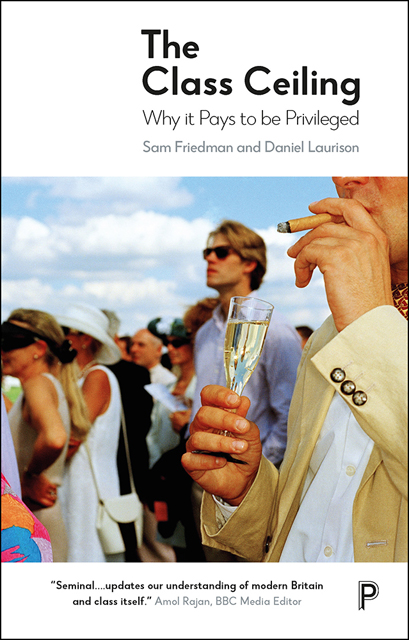Book contents
- Frontmatter
- Dedication
- Miscellaneous Frontmatter
- Contents
- List of figures and tables
- Acknowledgements
- Note on language usage
- Introduction
- one Getting in
- two Getting on
- three Untangling the class pay gap
- four Inside elite firms
- five The Bank of Mum and Dad
- six A helping hand
- seven Fitting in
- eight View from the top
- nine Self-elimination
- ten Class ceilings: A new approach to social mobility
- eleven Conclusion
- Epilogue: 10 ways to break the class ceiling
- Methodological appendix
- Notes
- References
- Index
two - Getting on
Published online by Cambridge University Press: 14 April 2023
- Frontmatter
- Dedication
- Miscellaneous Frontmatter
- Contents
- List of figures and tables
- Acknowledgements
- Note on language usage
- Introduction
- one Getting in
- two Getting on
- three Untangling the class pay gap
- four Inside elite firms
- five The Bank of Mum and Dad
- six A helping hand
- seven Fitting in
- eight View from the top
- nine Self-elimination
- ten Class ceilings: A new approach to social mobility
- eleven Conclusion
- Epilogue: 10 ways to break the class ceiling
- Methodological appendix
- Notes
- References
- Index
Summary
The publication of the BBC annual report is normally a fairly sedate affair. A 200-page document covering all areas of the Corporation’s governance and accounts, it’s fair to say that it doesn’t exactly make waves. But in 2017 things were very different. Dedicated to publishing the names of all staff earning over £150,000, the report uncovered for the first time a striking glass ceiling at ‘The Beeb’. Specifically it showed that over two-thirds of high-earners were men, as well as all seven of the highest paid BBC executives. It also detailed stark gender pay gaps between stars of similar experience, fame and stature. Sports presenters Gary Lineker and Claire Balding provide an arresting example. Both are longstanding and much-loved BBC personalities, yet in 2017 Balding earned only one-tenth of Lineker’s £1.75m salary.
In the days following the report, countless prominent figures – both inside and outside the organisation – lined up to denounce a normalised culture of gender discrimination at the BBC. The embattled BBC Director-General, Tony Hall, took swift action, authorising an immediate audit of staff pay, promising to end the gender pay gap by 2020 and later agreeing to reduce the salaries of six highly paid male presenters.
This scandal is significant for several reasons. First and foremost, it reveals the sheer scale of gender inequality at the upper echelons of British society. At the same time, however, it also shows the significant progress that has been made in elevating the gender pay gap to the top of the public agenda. After decades of campaigning and countless high-profile studies, pay gaps by gender (and, to a lesser extent, ethnicity) are now finally being meaningfully and pragmatically addressed. The response from Tony Hall, while not going as far as many wished, clearly reflected this shift. While in the past senior leaders may have tried to contest, or at least deflect, a scandal like this, Hall’s response was fairly unequivocal – the BBC had a serious problem, he admitted, and action must be taken.
The BBC annual report was also significant in the context of this book. It detailed, for the first time, data on the class backgrounds of BBC staff. Yet curiously, this was almost entirely ignored by the media. Only one journalist, Sky’s Lewis Goodall, picked up on the omission.
- Type
- Chapter
- Information
- The Class CeilingWhy It Pays to Be Privileged, pp. 45 - 56Publisher: Bristol University PressPrint publication year: 2019



